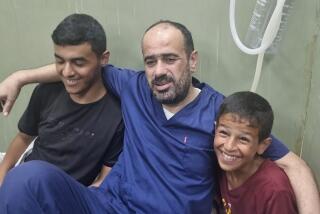O.C. Childrenâs Hospital in Battle With Star Doctor
ORANGE â Not long ago, Dr. Mitchell S. Cairo gained prominence as one of the best things that ever happened to kids with cancer in Orange County.
The specialist at Childrenâs Hospital of Orange County treated baseball Hall of Famer Rod Carewâs dying daughter. Last year, he appeared on the âTodayâ show and gained national repute for himself and the hospital as he struggled in vain to save her with an experimental transplant of umbilical cord blood.
For the record:
12:00 a.m. May 24, 1997 For the Record
Los Angeles Times Saturday May 24, 1997 Orange County Edition Part A Page 5 Metro Desk 2 inches; 37 words Type of Material: Correction
Childrenâs Hospital--An article Wednesday about Childrenâs Hospital of Orange County and one of its cancer specialists incorrectly reported plans for a scheduled meeting about a possible affiliation with St. Joseph Hospital. No meeting has been scheduled.
But now the only hospital in the county for children is locked in a battle with its most famous doctor that has raised questions about research practices and the financial future of the hospital.
* In January, the hospital abruptly stripped Cairo of several key posts, and succeeded in pressuring him to step down as chairman of a medical group he led for more than a dozen years. The group is responsible for much of the hospitalâs revenue.
* The hospital continues a lengthy review of Cairo by his medical peers that led to a temporary suspension of his hospital privileges. Hospital officials said he has since regained his privileges.
Although the reason for these actions remains a mystery, a recent federal audit criticized the hospital--and Cairo as its principal investigator--for putting patients on government-supported research studies and taking them off inappropriately, according to a summary of the audit obtained by The Times. As a result, Cairo was suspended from his top research role for the group that runs the studies, although he has retained other titles with the research group.
Cairo blames what he calls a few detractors who chafed during his years of leadership. He says the campaign against him was touched off by business difficulties between the medical group and the hospitalâs former chief executive officer, Thomas Penn Jones, who resigned abruptly in late January. Attempts to reach Jones for comment were unsuccessful.
âAny of these allegations and the inquiries associated with them were not conducted in a fair-minded way,â said Cairo, 46.
âThe present administration has been very reasonable and I think will bring most of these issues to a close in a very short period of time, and I will be vindicated.â
Cairo says he considers the audit findings minor, and is appealing the resulting suspension.
The hospitalâs falling-out with its star researcher is worsening what are already the toughest times in the hospitalâs history:
* The hospital estimates that it will post a loss of $13.1 million for the fiscal year ending June 30--the worst in its 33 years and nearly double last yearâs losses.
* Department heads have just been ordered to slash their budgets by 15%. And the boards of trustees of the hospital and neighboring St. Joseph Hospital plan to meet this week to consider âa close affiliationâ that would fall just short of a merger, an insider said.
* The hospital has temporarily closed its oncology intensive care unit for lack of patients but says it plans to reopen it by the end of the month. Overall, patient admissions have dropped by 25% over the past five years.
* In its struggle with Cairo, the hospital has alienated some major donors who have threatened to pull their support because of the way the doctor was treated.
Cairo was the first doctor in Orange County to perform transplants of âstemâ cells--culled from bone marrow, cord blood and the like--to restore a childâs immune system. The hospital remains the only place in the county where such transplants are available.
But as of January, Cairo no longer is head of the transplant program, and the number of such transplants has plummeted from a high of 34 in 1995 to four in the past eight months.
The hospital hired Cairo in 1981 to make its name in cancer research.
Cairo and his staff published prolifically in scientific journals, boosting the hospitalâs visibility and landing it membership in Childrenâs Cancer Group, an elite federally funded national cooperative of leading researchers. He became the principal investigator for the cancer groupâs program at the hospital.
Under his direction, the hospital racked up numerous firsts in Orange County--a bone marrow transplant in 1986; a bone marrow transplant from an unrelated donor in 1993; an umbilical cord blood transplant in 1995.
Cairo launched the hospitalâs fellowship program and expanded the Pediatric Subspecialty Faculty, a private physicianâs partnership of which he became chairman.
By 1995, he was the head of cancer research and directed the hospitalâs bone marrow transplant program.
But three physicians have filed suits in Orange County Superior Court against the hospital, Cairo and the rest of the medical partnership since 1995, alleging that they were denied access to the partnershipâs books under Cairoâs leadership.
Cairo denies all the allegations.
âI think people were concerned that there was turnover and were concerned that [Cairoâs] style of leadership was responsible for that,â said Dr. Nick Anas, who replaced Cairo as chairman of the partnership earlier this year. âWe were pretty open with him about that.â
Anas declined to comment on the lawsuits.
Cairo acknowledged that his expectations are high but said he is not difficult to work with.
âSomebody like myself might be seen a little bit differently than the majority of people who maybe arenât trying to get to a national or international level,â he said.
By mid-1995, differences between the hospital and the medical group were heightened, Cairo said, in part when then-chief executive Jones attempted to restrict the groupâs efforts to add more specialists.
That summer, the hospital reported its first serious losses--a staggering half a million dollars a month. It announced a cutback of 15% of the hospitalâs work force.
Last year, a committee looking for cost cuts scrutinized Cairoâs transplant program--until now his personal bailiwick--which relies on high-priced drugs and technologies.
Then last summer, the hospital demanded that the medical group boot Cairo as its chairman or jeopardize renewal of its contract with the hospital, Cairo and Anas said. The group came to a âmutual decisionâ with administrators in January that Cairo would not run for a new term.
Also in January, hospital administrators removed Cairo as director of the Bone Marrow Transplantation program, and stripped him of the directorship of the Hematology/Oncology Fellowship program.
Weeks afterward, Jones resigned as chief executive officer. L. Kenneth Heuler, chairman of the hospitalâs board of trustees, declined to comment on the reasons.
Cairo has fervent supporters. After the hospitalâs actions, more than a dozen parents of his patients formed a group in February to protest Cairoâs demotions and demand answers from hospital administrators.
In April came the results of the massive federal audit that found that patients had been moved into and out of research improperly in studies overseen by the Childrenâs Cancer Group. According to Cairo and another source familiar with the audit, nine patients were taken off experimental therapies, and most were assigned a transplant without another expert being first consulted. Two other patients were enrolled in studies when they werenât eligible.
Cairo said he was not the groupâs principal investigator when the two patients were enrolled and characterized the findings as ânot serious because they do not fall under anything that would be considered misconduct in research.â
The audit found âno instances of scientific misconduct,â allegations that sparked the probe, the report said.
Separately, Cairo remains the subject of an ongoing internal review at the hospital, though neither he nor hospital officials will comment on its focus. Heuler confirmed that the review by the hospitalâs medical executive committee continues, and that it led to a brief suspension of Cairoâs hospital privileges earlier this year. Meanwhile, he retains staff privileges and several titles at the hospital.
Times librarian Sheila Kern contributed to this story.
More to Read
Sign up for Essential California
The most important California stories and recommendations in your inbox every morning.
You may occasionally receive promotional content from the Los Angeles Times.











